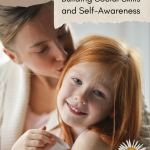Mastering Self-Awareness: The Importance of Identifying and Reflecting on Our Internal Experiences
Have you ever been in a situation where you felt overwhelmed by your emotions and didn’t know how to respond? Maybe you felt angry or upset but didn’t know why, or you were so anxious that you couldn’t think clearly. If so, you’re not alone. Understanding our own feelings and emotions can be a challenging task, but it is essential for our mental health and well-being.
For example, imagine you’re in a disagreement with someone you care about. You start to feel upset and angry, and you don’t know why. If you don’t take the time to identify and understand your emotions, you may respond impulsively and say something hurtful that you’ll regret later. However, if you take a step back and reflect on your feelings, you may realize that you’re actually feeling hurt or misunderstood. By communicating this in a calm and constructive way, you’re more likely to resolve the conflict and strengthen your relationship.

Photo by Jared Rice on Unsplash
Here, we will explore how to identify and understand our own feelings by introspecting and reflecting on our internal experiences. By developing these skills, we can manage our emotions more effectively and build more meaningful relationships in our lives.
Why it is important to identify our own feelings?
Self-awareness: When we are able to identify our own feelings, we develop greater self-awareness. This means we have a better understanding of our own emotions, thoughts, and behaviors, which allows us to make more informed choices and respond to situations in a way that is aligned with our values and goals.
Emotional regulation: Being able to identify and label our emotions can help us regulate them more effectively. For example, if we are feeling angry or anxious, we can take steps to calm ourselves down and prevent the emotions from escalating.
Improved relationships: When we are aware of our own feelings, we are better able to communicate them to others. This can lead to more authentic and meaningful relationships, as well as fewer misunderstandings and conflicts.
Increased empathy: Identifying our own feelings can also help us become more empathetic toward others. When we understand our own emotions, we are better able to understand and relate to the emotions of others.
Personal growth: Finally, identifying our own feelings can be a catalyst for personal growth and development. By exploring our emotions and thoughts, we can identify areas for improvement and work to overcome challenges or obstacles in our lives.
Overall, identifying our own feelings is an important step toward greater self-awareness, emotional regulation, improved relationships, increased empathy, and personal growth. By taking the time to reflect on our internal experiences, we can learn to navigate our emotions and thoughts more effectively and create a more fulfilling life for ourselves.
Strategies for introspecting and reflecting on our internal experiences
- Journaling: Writing in a journal can be a powerful tool for introspection and self-reflection. Set aside some time each day or week to write down your thoughts and feelings, without judgment. You can write about specific situations or events that triggered certain emotions or reflect on patterns you’ve noticed in your thoughts or behaviors.
For example, you might write about a recent argument you had with a friend and explore the underlying emotions and thoughts that led to the argument. Or, you might reflect on a recurring pattern in your relationships and consider what might be causing it.
- Mindfulness Meditation: Mindfulness meditation is a practice of paying attention to the present moment without judgment. It can help you become more aware of your thoughts and emotions, and increase your ability to observe them without getting caught up in them.
To start, find a quiet place where you won’t be disturbed and set a timer for 5-10 minutes. Sit comfortably with your eyes closed and focus on your breath. When your mind wanders, gently bring your attention back to your breath. As you practice, you can start to expand your awareness to include other physical sensations, thoughts, and emotions that arise.
- Talk to a trusted friend or therapist: Sometimes, it can be helpful to talk through your thoughts and emotions with someone else. Find a trusted friend or therapist who can provide a supportive and non-judgmental space for you to explore your internal experiences. You might start by sharing a specific situation or event that is troubling you and then explore the emotions and thoughts that arise in response.
For example, you might talk to a therapist about a recent breakup and explore the feelings of sadness and anger that you’re experiencing. Together, you might reflect on patterns in your relationships and consider how you can move forward in a more positive way.
- Engage in creative activities: Creativity can be a powerful tool for exploring and expressing our emotions. Engage in creative activities such as painting, drawing, writing, or dancing, and allow your emotions to guide your creative process. You might find that expressing yourself creatively helps you gain a deeper understanding of your emotions and thoughts.
For example, you might write a poem or song about a recent experience that triggered strong emotions, or create a painting that represents a particular feeling or mood.
- Practice self-compassion: When we introspect and reflect on our internal experiences, it’s important to approach ourselves with kindness and compassion. Be gentle with yourself and avoid self-criticism or judgment. Remember that it’s okay to feel difficult emotions and that everyone experiences struggles at times.
You might try practicing self-compassion by offering yourself words of encouragement or kindness when you’re feeling down. For example, you might say to yourself, “It’s okay to feel sad right now. I’m here for myself and will get through this.”
- Seek feedback from others: Sometimes, we can gain insight into our internal experiences by seeking feedback from others. Ask trusted friends or family members for their perspectives on a particular situation or behavior, and listen to their insights with an open mind. Keep in mind that others’ perspectives may differ from your own and that’s okay.
For example, you might ask a friend for their thoughts on a recent conflict with a coworker and consider how their perspective might help you better understand the situation.
- Identify and challenge negative thoughts: Sometimes, our thoughts can lead us to feel negative emotions such as anxiety or depression. When you notice negative thoughts arising, try to identify them and challenge them with more positive or balanced thoughts. This can help you shift your perspective and reduce the intensity of negative emotions.
For example, if you notice yourself thinking, “I’m not good enough,” challenge that thought by reminding yourself of your strengths and accomplishments.
- Use guided self-reflection tools: There are many tools and resources available to help with introspection and self-reflection. Guided meditation apps, online quizzes, and self-help books can provide prompts and guidance for exploring your thoughts and emotions.
For example, you might try a guided meditation focused on self-compassion or use an online quiz to explore your personality traits.
- Take action based on your insights: Introspection and self-reflection are most valuable when they lead to positive changes in our lives. Use the insights you gain from introspection to make concrete changes in your thoughts or behaviors that will support your well-being.
For example, if you notice that you tend to avoid conflict in relationships, use that insight to work on assertiveness skills and communicate more effectively.
Introspection and self-reflection are important tools for gaining insight into our internal experiences and promoting well-being. By using a variety of strategies and being kind to ourselves along the way, we can learn to navigate our emotions and thoughts more effectively.
A note to my readers:
Dear readers,
I want you to know that the journey of introspection and self-reflection is not an easy one, but it is one that is well worth taking. When you take the time to identify and reflect on your internal experiences, you are taking a step toward becoming a better, more self-aware human being.
By engaging in practices such as mindfulness, journaling, meditation, and creative expression, you are developing the skills to navigate your emotions and thoughts more effectively. This will help you make better decisions, form stronger relationships, and create a life that is aligned with your values and goals.
Furthermore, by practicing self-compassion and challenging negative thoughts, you are building resilience and developing a more positive outlook on life. This can help you overcome challenges and setbacks with greater ease, and bounce back from difficult situations.
In short, the benefits of introspection and self-reflection are vast and far-reaching. They can help you succeed in all areas of your life, from your personal relationships to your career goals. So I encourage you to take the time to explore your internal experiences, and to do so with kindness, compassion, and an open mind. Your journey of self-discovery is just beginning, and I can’t wait to see where it takes you.








